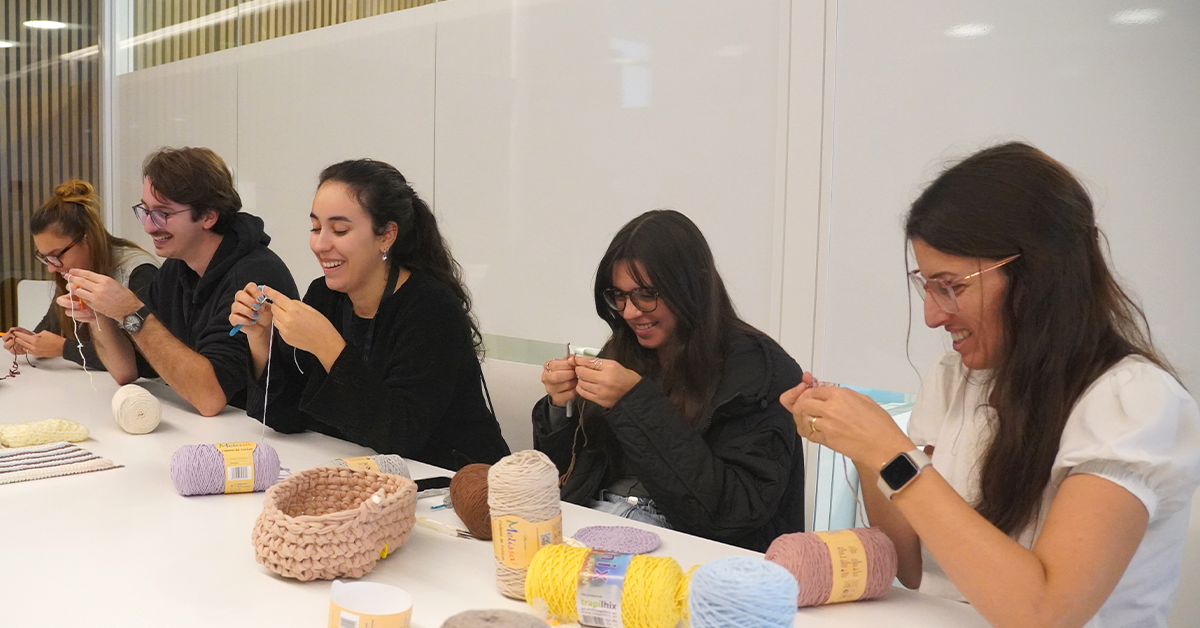How to manage psychosocial risks at work
Burnout, stress, mental health... how many times a day do you hear these words? Companies have been betting on mitigating these problems, which arise from psychosocial risks. In this second article, we show you the actions Fabamaq has implemented to prevent these challenges!
Discover how to prevent and avoid psychosocial risks at work
At a time when the warning about the effects of psychosocial risks opens the door to a greater awareness of mental health in a business context, investing in the emotional sustainability of employees has been a challenge for many organizations. But what are psychosocial risks?
Understanding Psychosocial Risks at work
Psychosocial risks derive from adverse social interactions or contexts, which may occur in a work context and cause feelings of discontent, upset and unhappiness. To learn more about psychosocial risks and how to detect them, you can read the first part of our articles dedicated to this topic.
Over time, the negative triggers arising from work problems or poor communication between teams can become a real snowball. Making the internal public feel motivated, heard and fulfilled in the performance of their duties is essential and there are techniques that can help manage these setbacks.
Step-by-step guide to avoid psychosocial risks
At Fabamaq, we have implemented a set of measures to determine the main constraints felt by our Gamers and come up with solutions that meet their concerns, through the contribution of their teams.
Although it is a process that requires continuous improvement, we will tell you the 4 steps taken at Fabamaq to deal with psychosocial risks in our reality.
Step 1: In-depth questionnaires
It is no coincidence that one of the buzzwords of the moment is feedback! Getting employees' perspectives on their own work, organizational processes, team management or even communication between managers and employees is extremely beneficial for organizations.
Conducting in-depth employee surveys should be the first step. The surveys distributed at Fabamaq were inspired by COPSOQ II, being of short duration and using both numerical and qualitative scales. These questionnaires contain questions such as:
- How do you evaluate your level of daily stress in the duties you perform?
- How do you rate your daily workload?
- Do you feel that your work is recognized and appreciated by your manager?
- Is there a good working environment between you and your colleagues?
- Do you feel that you are integrated with the team?
- Does your work mean something to you?
- Do you feel that your work is important for the organization?
- Do you participate in the choices of the people you work with?
- Can you influence the amount of work that goes into it?
- Are you able to solve problems if you try hard enough?
- Among other examples...
Identifying priority actions taking into account the information gathered from employees with these surveys was the starting point to find implementation measures to mitigate these problems in the future.
Step 2: Presentation of the results
Fabamaq's People Partners further analyzed the data received in the first step. The goal of this careful analysis of the information was to identify problems that could cause symptoms such as burnout syndrome, dissatisfaction or emotional stress in the internal public.
The alliance between the team responsible for People Management and the person in charge of Labour Medicine at Fabamaq was also crucial at this stage. The joint work of these two agents made it possible to study and interpret the data collected from the group of employees to physical and mental health specialists, facilitating the creation of useful diagnoses and practical solutions.
After the diagnosis, came the communication. Fabamaq organized a Knowledge Sharing with the purpose of disseminating the survey results in a sharing session with employees, fostering transparency in data communication and enhancing the awareness of the teams.
Step 3: Focus Groups
In the third step of this journey, Fabamaq organized a Focus Group with a 45 minutes duration, with the participation of 15 Gamers from different business areas. Collecting suggestions for improvement to mitigate the effects of the psychosocial risks found was the starting point that motivated the initiative.
After the informal dynamics among Gamers participants, 45 recommendations were shared to improve the workflow and aspects related to the dimensions of Burnout, Stress, Cognitive Demands, Work Influence, Work Predictability, General Health, Work-Family Conflict and Sleep Problems.
Step 4: Applying solutions
Based on the suggested recommendations, some actions were immediately streamlined to solve identified problems. Additionally, action plans were structured for other larger intervention points. Receiving the opinions of our Gamers was, therefore, fundamental to establishing priorities in the definition of strategies that will increase well-being and bring more quality work at Fabamaq.
However, prevention and intervention work linked to psychosocial risks is a process of continuous improvement in which any organization must continue to test and improve.
There are no exact sciences in people management, hence the need for all actions that may result in an improvement to be tested, refined and redefined in order to exceed the employees' expectations. Tiago Gomes, People Partner at Fabamaq, complements this idea: "This challenge has been continuously improved and we still have many strategies to apply in the future. We are overflowing with ideas."
Looking for a job? Fabamaq is recruiting
In 2021, Fabamaq was awarded 1st place in the Healthy Workplaces in the Medium-Sized Companies category. According to Luís Silva, Global Head of People, Interaction and Brand at Fabamaq, the application of all the above steps led to "greater involvement in internal improvement suggestion processes (...) and other feedback collection methods, an indicator that shows that employees feel integrated and listened to, and that they want to be part of the change".
With over 240 Gamers on its team, Fabamaq has open positions for several areas of its operation. From mathematics to game development, project management, data science, and software development, there are several job openings to explore. Don't miss out on what could be the jackpot of your career!



